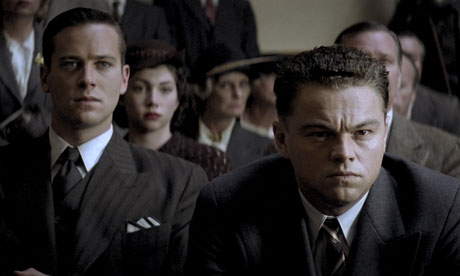
Warner Brothers helped create the heroic myth of the FBI and its founder, J Edgar Hoover, in the 1930s when the studio was persuaded to balance its gangster movies with pictures that made heroes of FBI agents battling the underworld, Nazi agents and communist subversives. The keystone of the edifice came in 1959 when James Stewart starred in The FBI Story, which depicted the bureau as the embodiment of Americanism. Warners gave and Warners taketh away, and since Hoover's death in 1972, which occurred a month before the Watergate break-in, the studio has contributed to the dismantling of Hoover and everything he stood for, starting with All the President's Men and culminating in Clint Eastwood's J. Edgar.
In Scorsese's The Aviator, Leonardo DiCaprio created a flattering portrait of another American hero, Howard Hughes. In J. Edgar, he portrays Hoover as a deranged control freak, raised by an overbearing mother to have an inflated sense of destiny. This resulted in the creation of a world-famous national police force that was part of a virtual police state dominated by Hoover. He was a dedicated public servant convinced that the ends justified the means, and he stayed in power from the 1920s until his death by using his secret files to blackmail every American president from Roosevelt (he had the goods on Eleanor's sex life) to his close friend, Richard Nixon. According to this film, Nixon's first passionate reaction to J Edgar's death was to call him a "cocksucker".
Scripted by Dustin Lance Black (who won a scriptwriting Oscar for his film about gay activist Harvey Milk), the film tells the story fragmentarily and out of chronological order, partly through Hoover dictating his own self-aggrandising memoirs. It doesn't ignore the man's vanity, vindictiveness and phobias. Nor does it skip over the crucial relationship with Clyde Tolson, his handsome, cultivated, inseparable assistant and long-time companion. Indeed, the movie might well have been called "Eddie and Clyde". But it stops short of suggesting a physically consummated affair.
It does, however, miss out some important areas (there's nothing on Truman or the House Un-American Activities Committee) and is misleading on his alliance with Joe McCarthy. It's enjoyable, too evenly paced, and much inferior to Larry Cohen's 1977 The Private Files of J. Edgar Hoover, a lively act of revenge starring Broderick Crawford as the pathetic, paranoid puritan.

